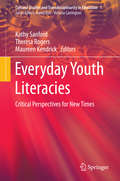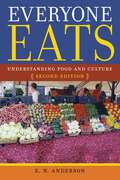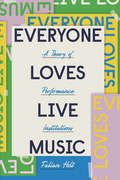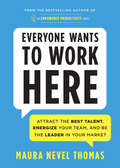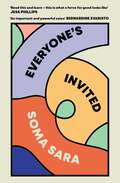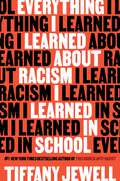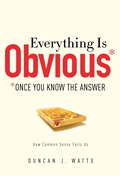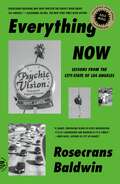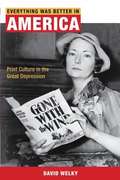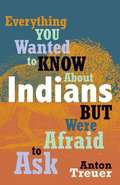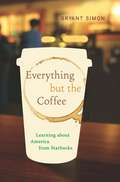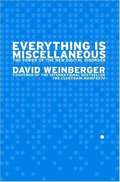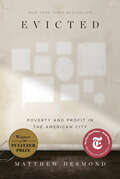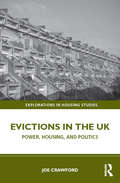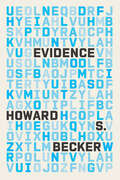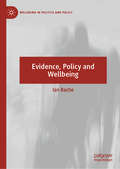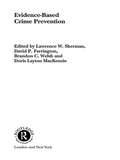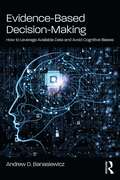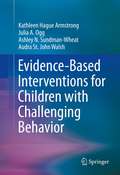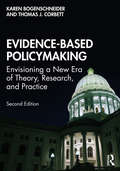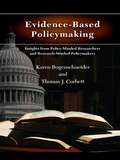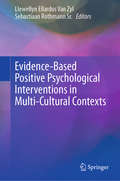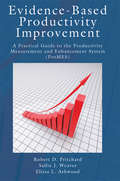- Table View
- List View
Everyday Youth Literacies
by Kathy Sanford Theresa Rogers Maureen KendrickTestifying to the maturity of the youth literacy education field, this collection of papers displays the increasing sophistication of research on the subject, and at the same time offers pointers to its potential for development in the next decade. The contributors track the rapid proliferation of youth literacies in today's digital age, from video games to social media and film production. Drawing on detailed research and an intimate knowledge of youth communities in nations as diverse as Canada and Uganda, they provide notable examples of digital literacies in situ, and challenge conventional wisdom about literacy education. The chapters do more, however, than merely offer reportage of a crisis in literacy education. The authors embrace the core challenge faced by educators everywhere: how to incorporate and utilize new modes of literacy in education, and how to realize the potential benefits of heterogeneous modern media in youth literacy education, especially in marginalized, remote, and disadvantaged communities. This volume expands our view of digital communications technologies and digital literacies to include complex understandings of how media such as translated videos can serve as learning tools for youths whose access to literacy education is limited. In particular, a number of contributing scholars provide important new information about the praxis of teachers and the literacies adopted by young people in Africa, a continent largely neglected by literacy researchers. This book's global perspective, and its ground-level viewpoint of youth literacy practices in a variety of locations, problematizes normative assumptions about researching literacy as well as about literacy itself.
Everyone Eats: Understanding Food and Culture
by E. N. AndersonAn illuminating anthropological study of the ways that cultures and political systems structure the edible environment. Everyone eats, but rarely do we investigate why we eat what we eat. Why do we love spices, sweets, coffee? How did rice become such a staple food throughout so much of eastern Asia? Everyone Eats examines the social and cultural reasons for our food choices and provides an explanation of the nutritional reasons for why humans eat what they do, resulting in a unique cultural and biological approach to the topic. E. N. Anderson explains the economics of food in the globalization era; food&’s relationship to religion, medicine, and ethnicity; and offers suggestions on how to end hunger, starvation, and malnutrition. This thoroughly updated Second Edition incorporates the latest food scholarship, most notably recognizing the impact of sustainable eating advocacy and the state of food security in the world today. Anderson also brings more insight than ever before into the historical and scientific underpinnings of our food customs, fleshing this out with fifteen new and original photographs from his own extensive fieldwork. A perennial classic in the anthropology of food, Everyone Eats feeds our need to understand human ecology by explaining the ways that cultures and political systems structure the edible environment.
Everyone Loves Live Music: A Theory of Performance Institutions (Big Issues in Music)
by Fabian HoltFor decades, millions of music fans have gathered every summer in parks and fields to hear their favorite bands at festivals such as Lollapalooza, Coachella, and Glastonbury. How did these and countless other festivals across the globe evolve into glamorous pop culture events, and how are they changing our relationship to music, leisure, and public culture? In Everyone Loves Live Music, Fabian Holt looks beyond the marketing hype to show how festivals and other institutions of musical performance have evolved in recent decades, as sites that were once meaningful sources of community and culture are increasingly subsumed by corporate giants. Examining a diverse range of cases across Europe and the United States, Holt upends commonly-held ideas of live music and introduces a pioneering theory of performance institutions. He explores the fascinating history of the club and the festival in San Francisco and New York, as well as a number of European cities. This book also explores the social forces shaping live music as small, independent venues become corporatized and as festivals transform to promote mainstream Anglophone culture and its consumerist trappings. The book further provides insight into the broader relationship between culture and community in the twenty-first century. An engaging read for fans, industry professionals, and scholars alike, Everyone Loves Live Music reveals how our contemporary enthusiasm for live music is more fraught than we would like to think.
Everyone Loves Live Music: A Theory of Performance Institutions (Big Issues in Music)
by Fabian HoltFor decades, millions of music fans have gathered every summer in parks and fields to hear their favorite bands at festivals such as Lollapalooza, Coachella, and Glastonbury. How did these and countless other festivals across the globe evolve into glamorous pop culture events, and how are they changing our relationship to music, leisure, and public culture? In Everyone Loves Live Music, Fabian Holt looks beyond the marketing hype to show how festivals and other institutions of musical performance have evolved in recent decades, as sites that were once meaningful sources of community and culture are increasingly subsumed by corporate giants. Examining a diverse range of cases across Europe and the United States, Holt upends commonly-held ideas of live music and introduces a pioneering theory of performance institutions. He explores the fascinating history of the club and the festival in San Francisco and New York, as well as a number of European cities. This book also explores the social forces shaping live music as small, independent venues become corporatized and as festivals transform to promote mainstream Anglophone culture and its consumerist trappings. The book further provides insight into the broader relationship between culture and community in the twenty-first century. An engaging read for fans, industry professionals, and scholars alike, Everyone Loves Live Music reveals how our contemporary enthusiasm for live music is more fraught than we would like to think.
Everyone Loves Live Music: A Theory of Performance Institutions (Big Issues in Music)
by Fabian HoltFor decades, millions of music fans have gathered every summer in parks and fields to hear their favorite bands at festivals such as Lollapalooza, Coachella, and Glastonbury. How did these and countless other festivals across the globe evolve into glamorous pop culture events, and how are they changing our relationship to music, leisure, and public culture? In Everyone Loves Live Music, Fabian Holt looks beyond the marketing hype to show how festivals and other institutions of musical performance have evolved in recent decades, as sites that were once meaningful sources of community and culture are increasingly subsumed by corporate giants. Examining a diverse range of cases across Europe and the United States, Holt upends commonly-held ideas of live music and introduces a pioneering theory of performance institutions. He explores the fascinating history of the club and the festival in San Francisco and New York, as well as a number of European cities. This book also explores the social forces shaping live music as small, independent venues become corporatized and as festivals transform to promote mainstream Anglophone culture and its consumerist trappings. The book further provides insight into the broader relationship between culture and community in the twenty-first century. An engaging read for fans, industry professionals, and scholars alike, Everyone Loves Live Music reveals how our contemporary enthusiasm for live music is more fraught than we would like to think.
Everyone Wants to Work Here: Attract the Best Talent, Energize Your Team, and Be the Leader in Your Market (Empowered Productivity)
by Maura ThomasBe the leader your team wants to followYou want to be the kind of leader that leaves a legacy of positive impact. You want to lead an exceptional team so you can power your organization's success and unleash the hidden potential in every team member – including yourself! So how do you realize these goals?In this expansive guide, expert Maura Thomas explores how to combat insidious problems that are costing your organization millions. You can change the status quo with her step-by-step guidance to energize your team, and provide greater focus, transparency, and accountability in the organization. Leaders and aspiring leaders like you will discover how to not only extinguish—but prevent—the dozens of "fires" that pop up all day. You can transform a stressful culture into an empowering one, or a great culture into one where top talent is lining up to be a part of your team. Imagine having consistently productive and satisfying work days, and contributing even more to the organization—but in a way that's inspiring and motivating instead of overwhelming and depleting.The techniques in this book will not only help you, your team and your organization, they'll boost your ability to contribute in a positive way to families, your community, and the world.
Everyone's Invited
by Soma Sara'Read this and learn – this is what a force for good looks like' Jess Phillips MP 'Her work has directly contributed to a groundswell of pent-up frustration and exhaustion from women and girls who have simply had enough. And people are listening.&’ The Independent &‘Soma&’s efforts feel more pressing than ever&’ VogueWe are all a part of a culture that is broken – and nobody benefits from it. It&’s in the news we read, the films we watch, the music we listen to, the people we surround ourselves with, the institutions we navigate, the laws we follow, and the streets we walk. We are part of a system that was founded on inequality and drastic power imbalance. Of course, many things are better than they were. But the age of social media has dramatically exposed truths previously hidden. In this collection of essays, covering subjects from porn to the patriarchy, Soma Sara draws a line between the different facets of our society that enable inequality to flourish. The scale of the problem is vast, and deeply entrenched in all of us. Here, Soma Sara argues that we can flip the script and start solving the problem – and create a better society for everyone.Everyone&’s Invited is an essential and enlightening force to push us forward to a more equal world.
Everything I Learned About Racism I Learned in School
by Tiffany JewellFrom the #1 New York Times bestselling author of This Book Is Anti-Racist and The Antiracist Kid, Tiffany Jewell, this YA nonfiction book, highlighting inequities Black and Brown students face from preschool through college, is the most important, empowering read this year.From preschool to higher education and everything in between, Everything I Learned About Racism I Learned in School focuses on the experiences Black and Brown students face as a direct result of the racism built into schools across the United States.The overarching nonfiction narrative follows author Tiffany Jewell from early elementary school through her time at college, unpacking the history of systemic racism in the American educational system along the way. Throughout the book, other writers of the global majority share a wide variety of personal narratives and stories based on their own school experiences.Contributors include New York Times bestseller Joanna Ho; award winners Minh Lê, Randy Ribay, and Torrey Maldonado; authors James Bird and Rebekah Borucki; author-educators Amelia A. Sherwood, Roberto Germán, Liz Kleinrock, Gary R. Gray Jr., Lorena Germán, Patrick Harris II, shea wesley martin, David Ryan Barcega Castro-Harris, Ozy Aloziem, Gayatri Sethi, and Dulce-Marie Flecha; and even a couple of teen writers!Everything I Learned About Racism I Learned in School provides young folks with the context to think critically about and chart their own course through their current schooling—and any future schooling they may pursue.
Everything Is Obvious: *Once You Know the Answer
by Duncan J. WattsWhy is the Mona Lisa the most famous painting in the world? Why did Facebook succeed when other social networking sites failed? Did the surge in Iraq really lead to less violence? How much can CEO’s impact the performance of their companies? And does higher pay incentivize people to work hard?If you think the answers to these questions are a matter of common sense, think again. As sociologist and network science pioneer Duncan Watts explains in this provocative book, the explanations that we give for the outcomes that we observe in life—explanation that seem obvious once we know the answer—are less useful than they seem.Drawing on the latest scientific research, along with a wealth of historical and contemporary examples, Watts shows how common sense reasoning and history conspire to mislead us into believing that we understand more about the world of human behavior than we do; and in turn, why attempts to predict, manage, or manipulate social and economic systems so often go awry.It seems obvious, for example, that people respond to incentives; yet policy makers and managers alike frequently fail to anticipate how people will respond to the incentives they create. Social trends often seem to have been driven by certain influential people; yet marketers have been unable to identify these “influencers” in advance. And although successful products or companies always seem in retrospect to have succeeded because of their unique qualities, predicting the qualities of the next hit product or hot company is notoriously difficult even for experienced professionals.Only by understanding how and when common sense fails, Watts argues, can we improve how we plan for the future, as well as understand the present—an argument that has important implications in politics, business, and marketing, as well as in science and everyday life.
Everything Now: Lessons from the City-State of Los Angeles
by Rosecrans BaldwinA LOS ANGELES TIMES BESTSELLER. NAMED A MOST ANTICIPATED BOOK OF 2021 BY THE MILLIONSA provocative, exhilaratingly new understanding of the United States’ most confounding metropolis—not just a great city, but a full-blown modern city-stateAmerica is obsessed with Los Angeles. And America has been thinking about Los Angeles all wrong, for decades, on repeat. Los Angeles is not just the place where the American dream hits the Pacific. (It has its own dreams.) Not just the vanishing point of America’s western drive. (It has its own compass.) Functionally, aesthetically, mythologically, even technologically, an independent territory, defined less by distinct borders than by an aura of autonomy and a sense of unfurling destiny—this is the city-state of Los Angeles.Deeply reported and researched, provocatively argued, and eloquently written, Rosecrans Baldwin's Everything Now approaches the metropolis from unexpected angles, nimbly interleaving his own voice with a chorus of others, from canonical L.A. literature to everyday citizens. Here, Octavia E. Butler and Joan Didion are in conversation with activists and astronauts, vampires and veterans. Baldwin records the stories of countless Angelenos, discovering people both upended and reborn: by disasters natural and economic, following gospels of wealth or self-help or personal destiny. The result is a story of a kaleidoscopic, vibrant nation unto itself—vastly more than its many, many parts.Baldwin’s concept of the city-state allows us, finally, to grasp a place—Los Angeles—whose idiosyncrasies both magnify those of America, and are so fully its own. Here, space and time don’t quite work the same as they do elsewhere, and contradictions are as stark as southern California’s natural environment. Perhaps no better place exists to watch the United States’s past, and its possible futures, play themselves out. Welcome to Los Angeles, the Great American City-State.
Everything Was Better in America: Print Culture in the Great Depression
by David WelkyAs a counterpart to research on the 1930s that has focused on liberal and radical writers calling for social revolution, David Welky offers this eloquent study of how mainstream print culture shaped and disseminated a message affirming conservative middle-class values and assuring its readers that holding to these values would get them through hard times. Through analysis of the era's most popular newspaper stories, magazines, and books, Welky examines how voices both outside and within the media debated the purposes of literature and the meaning of cultural literacy in a mass democracy. He presents lively discussions of such topics as the newspaper treatment of the Lindbergh kidnapping, issues of race in coverage of the 1936 Olympic games, domestic dynamics and gender politics in cartoons and magazines, Superman's evolution from a radical outsider to a spokesman for the people, and the popular consumption of such novels as the Ellery Queen mysteries, Gone with the Wind, and The Good Earth. Through these close readings, Welky uncovers the subtle relationship between the messages that mainstream media strategically crafted and those that their target audience wished to hear.
Everything You Wanted To Know About Indians But Were Afraid To Ask
by Anton TreuerIn matter-of-fact responses to over 120 questions, both thoughtful and outrageous, modern and historical, Ojibwe scholar and cultural preservationist Anton Treuer gives a frank, funny, and sometimes personal tour of what's up with Indians, anyway. --What is the real story of Thanksgiving? --Why are tribal languages important? --What do you think of that incident where people died in a sweat lodge? White/Indian relations are often characterized by guilt and anger. Everything You Wanted to Know about Indians but Were Afraid to Ask cuts through the emotion and builds a foundation for true understanding and positive action.
Everything but the Coffee: Learning about America from Starbucks
by Bryant SimonEverything but the Coffee casts a fresh eye on the world's most famous coffee company, looking beyond baristas, movie cameos, and Paul McCartney CDs to understand what Starbucks can tell us about America. Bryant Simon visited hundreds of Starbucks around the world to ask, Why did Starbucks take hold so quickly with consumers? What did it seem to provide over and above a decent cup of coffee? Why at the moment of Starbucks' profit-generating peak did the company lose its way, leaving observers baffled about how it might regain its customers and its cultural significance? Everything but the Coffee probes the company's psychological, emotional, political, and sociological power to discover how Starbucks' explosive success and rapid deflation exemplify American culture at this historical moment. Most importantly, it shows that Starbucks speaks to a deeply felt American need for predictability and class standing, community and authenticity, revealing that Starbucks' appeal lies not in the product it sells but in the easily consumed identity it offers.
Everything is Miscellaneous: The Power of the New Digital Disorder
by David WeinbergerIn Everything Is Miscellaneous, David Weinberger charts the new principles of digital order that are remaking business, education, politics, science, and culture. In his rollicking tour of the rise of the miscellaneous, he examines why the Dewey decimal system is stretched to the breaking point, how Rand McNally decides what information not to include in a physical map (and why Google Earth is winning that battle), how Staples stores emulate online shopping to increase sales, why your children's teachers will stop having them memorize facts, and how the shift to digital music stands as the model for the future in virtually every industry. Finally, he shows how by "going miscellaneous," anyone can reap rewards from the deluge of information in modern work and life.
Evicted: Poverty and Profit in the American City
by Matthew DesmondNEW YORK TIMES BESTSELLER • WINNER OF THE PULITZER PRIZE • ONE OF TIME&’S TEN BEST NONFICTION BOOKS OF THE DECADE • ONE OF THE NEW YORK TIMES&’S 100 BEST BOOKS OF THE 21ST CENTURY One of the most acclaimed books of our time, this modern classic &“has set a new standard for reporting on poverty&” (Barbara Ehrenreich, The New York Times Book Review).In Evicted, Princeton sociologist and MacArthur &“Genius&” Matthew Desmond follows eight families in Milwaukee as they each struggle to keep a roof over their heads. Hailed as &“wrenching and revelatory&” (The Nation), &“vivid and unsettling&” (New York Review of Books), Evicted transforms our understanding of poverty and economic exploitation while providing fresh ideas for solving one of twenty-first-century America&’s most devastating problems. Its unforgettable scenes of hope and loss remind us of the centrality of home, without which nothing else is possible. A BEST BOOK OF THE YEAR: President Barack Obama, The New York Times Book Review, The Boston Globe, The Washington Post, NPR, Entertainment Weekly, The New Yorker, Bloomberg, Esquire, BuzzFeed, Fortune, San Francisco Chronicle, Milwaukee Journal Sentinel, St. Louis Post-Dispatch, Politico, The Week, Chicago Public Library, BookPage, Kirkus Reviews, Library Journal, Publishers Weekly, Booklist, Shelf AwarenessWINNER OF: The National Book Critics Circle Award for Nonfiction • The PEN/John Kenneth Galbraith Award for Nonfiction • The Andrew Carnegie Medal for Excellence in Nonfiction • The Hillman Prize for Book Journalism • The PEN/New England Award • The Chicago Tribune Heartland PrizeFINALIST FOR THE LOS ANGELES TIMES BOOK PRIZE AND THE KIRKUS PRIZE&“Evicted stands among the very best of the social justice books.&”—Ann Patchett, author of Bel Canto and Commonwealth &“Gripping and moving—tragic, too.&”—Jesmyn Ward, author of Salvage the Bones &“Evicted is that rare work that has something genuinely new to say about poverty.&”—San Francisco Chronicle
Evictions in the UK: Power, Housing, and Politics (Explorations in Housing Studies)
by Joe CrawfordEvictions in the UK examines the relationships between tenants, landlords, housing providers and government agencies and the tensions and conflicts that characterise these relations. The book shows how power dynamics are being reconfigured in the post-welfare context of the first quarter of the 21st century, as evictions for rent arrears are becoming one of the most significant threats to both the wellbeing of the social housing sector and the welfare of its tenants. Embracing both practical and critical approaches, this book offers a comprehensive understanding of the contradictory and thus controversial issue of evictions. It explores the range of perspectives involved in the practice – landlords carrying out evictions, those agencies providing legal assistance to evictees, as well as academics and institutions charged with researching and regulating the process. Drawing on three case studies relating to evictions across Scotland and England, this book provides a comprehensive look at the punitive consequences of poverty (evictions for rent arrears) and status (evictions under immigration law) that are applicable to social housing systems worldwide. Based on original, primary-source data, this book will be a key resource for academics and students as well as policy makers and practitioners in the fields of housing studies, planning, social welfare, and political sociology.
Evidence
by Howard S. BeckerHoward S. Becker is a master of his discipline. His reputation as a teacher, as well as a sociologist, is supported by his best-selling quartet of sociological guidebooks: Writing for Social Scientists, Tricks of the Trade, Telling About Society, and What About Mozart? What About Murder? It turns out that the master sociologist has yet one more trick up his sleeve—a fifth guidebook, Evidence. Becker has for seventy years been mulling over the problem of evidence. He argues that social scientists don’t take questions about the usefulness of their data as evidence for their ideas seriously enough. For example, researchers have long used the occupation of a person’s father as evidence of the family’s social class, but studies have shown this to be a flawed measure—for one thing, a lot of people answer that question too vaguely to make the reasoning plausible. The book is filled with examples like this, and Becker uses them to expose a series of errors, suggesting ways to avoid them, or even to turn them into research topics in their own right. He argues strongly that because no data-gathering method produces totally reliable information, a big part of the research job consists of getting rid of error. Readers will find Becker’s newest guidebook a valuable tool, useful for social scientists of every variety.
Evidence, Policy and Wellbeing (Wellbeing in Politics and Policy)
by Ian BacheThis book analyses the role of evidence in taking wellbeing from an issue that has government attention to one that leads to significant policy change. In doing so, it draws on contributions from political science, policy theory and literature specifically on the evidence and policy relationship. The book has three main aims: to understand the role of evidence in shaping the prospects for wellbeing in public policy; to inform the barriers literature on the use of evidence in policy; and, to inform the multiple streams approach (MSA) to agenda-setting. While the book focuses on developments at UK government level, a number of the findings and arguments presented here have wider significance, both in relation to wellbeing developments elsewhere and to the theoretical literatures on agenda-setting and evidence use. The book draws on insights from interviews with policy-makers and stakeholders that were undertaken as part of the work of the Community Wellbeing Evidence Programme of the What Works Centre for Wellbeing.
Evidence-Based Crime Prevention: Lessons From Systematic Reviews (Springer Series On Evidence-based Crime Policy Ser.)
by Brandon C. Welsh David P. Farrington Lawrence W. Sherman Doris Layton MacKenzieCrime prevention policy and practice is, on the whole, far from objective. Instead of being based on scientific evidence, the crime policy agenda is seemingly driven by political ideology, anecdotal evidence and programme trends. Evidence-Based Crime Prevention seeks to change this by comprehensively and rigorously assessing the existing scientific knowledge on the effectiveness of crime prevention programmes internationally. Reviewing more than 600 scientific evaluations of programmes intended to prevent crime in settings such as families, schools, labour markets and communities, this book grades programmes on their scientific validity using the 'scientific methods scale'. This collection, which brings together contributions from leading researchers in the field of crime prevention, will provide policy-makers, researchers and community leaders with an understandable source of information about what works, what does not work and what is promising in preventing crime.
Evidence-Based Decision-Making: How to Leverage Available Data and Avoid Cognitive Biases
by Andrew D. BanasiewiczEvidence-Based Decision-Making: How to Leverage Available Data and Avoid Cognitive Biases examines how a wide range of factual evidence, primarily derived from a variety of data available to organizations, can be used to improve the quality of business decision-making, by helping decision makers circumvent the various cognitive biases that adversely impact how we all think. The book is built on the following premise: During the past decade, the new ‘data world’ emerged, in which the rush to develop competencies around business analytics and data science can be characterized as nothing less than the new commercial arms race. The ever-expanding volume and variety of data are well known, as are the great advances in data processing/analytics, data visualization, and related information production-focused capabilities. Yet, comparatively little effort has been devoted to how the informational products of business analytics and data science are ‘consumed’ or used in the organizational decision-making processes, as the available evidence shows that only some of that information is used to drive some business decisions some of the time. Evidence-Based Decision-Making details an explicit process describing how the universe of available and applicable evidence, which includes organizational and other data, industry benchmarks, scientific studies, and professional experience, can be assessed, amalgamated, and funneled into an objective driver of key business decisions. Introducing key concepts in relation to data and evidence, and the history of evidence-based management, this new and extremely topical book will be essential reading for researchers and students of data analytics as well as those working in the private and public sectors, and in the voluntary sector.
Evidence-Based Interventions for Children with Challenging Behavior
by Audra St. John Walsh Kathleen Hague Armstrong Julia A. Ogg Ashley N. Sundman-WheatWhen a child has difficulties eating or sleeping, or throws frequent tantrums, many parents cross their fingers and hope it's a phase to be outgrown soon. But when they persist, challenging behaviors can follow children to school, contributing to academic problems, social difficulties, and further problems in adolescence and adulthood. The authors of Evidence-Based Interventions for Children with Challenging Behavior take a preventive approach in this concise, well-detailed guide. Offering best practices from an extensive Response to Intervention (RTI) evidence base, the book provides guidelines for recognizing the extent of feeding, sleeping, toileting, aggression, and other issues, and supplies successful primary, secondary, and tertiary interventions with rationales. Case examples integrate developmental theories and behavior principles into practice, illustrate how strategies work, and show how to ensure that parents and caregivers can implement them consistently for maximum effect. Progress charts, content questions, and other helpful features make this an invaluable resource for students and professionals alike. Included in the coverage: The prevention model and problem solving.Screening techniques.Evidence-based practices with children and their caregivers.Behavior principles and their application.Monitoring progress and evaluating outcomes.Plus helpful appendices, resource links, and other learning tools. Evidence-Based Interventions for Children with Challenging Behavior is an essential text for graduate students, scientist-practitioners/professionals, and researchers in child and school psychology; assessment, testing and evaluation; occupational therapy; family; educational psychology; and speech pathology.
Evidence-Based Policymaking: Envisioning a New Era of Theory, Research, and Practice
by Karen Bogenschneider Thomas CorbettNew thinking is needed on the age-old conundrum of how to connect research and policymaking. Why does a disconnect exist between the research community, which is producing thousands of studies relevant to public policy, and the policy community, which is making thousands of decisions that would benefit from research evidence? The second edition updates community dissonance theory and provides an even stronger, more substantiated story of why research is underutilized in policymaking, and what it will take to connect researchers and policymakers. This book offers a fresh look into what policymakers and the policy process are like, as told by policymakers themselves and the researchers who study and work with them. New to the second edition: • The point of view of policymakers is infused throughout this book based on a remarkable new study of 225 state legislators with an extraordinarily high response rate in this hard-to-access population. • A new theory holds promise for guiding the study and practice of evidence-based policy by building on how policymakers say research contributes to policymaking. • A new chapter features pioneering researchers who have effectively influenced public policy by engaging policymakers in ways rewarding to both. • A new chapter proposes how an engaged university could provide culturally competent training to create a new type of scholar and scholarship. This review of state-of-the-art research on evidence-based policy is a benefit to readers who find it hard to keep abreast of a field that spans the disciplines of business, economics, education, family sciences, health services, political science, psychology, public administration, social work, sociology, and so forth. For those who study evidence-based policy, the book provides the basics of producing policy relevant research by introducing researchers to policymakers and the policy process. Strategies are provided for identifying research questions that are relevant to the societal problems that confront and confound policymakers. Researchers will have at their fingertips a breath-taking overview of classic and cutting-edge studies on the multi-disciplinary field of evidence-based policy. For instructors, the book is written in a language and style that students find engaging. A topic that many students find mundane becomes germane when they read stories of what policymakers are like, and when they learn of researcher’s tribulations and triumphs as they work to build evidence-based policy. To point students to the most important ideas, the key concepts are highlighted in text boxes. For those who desire to engage policymakers, a new chapter summarizes the breakthroughs of several researchers who have been successful at driving policy change. The book provides 12 innovative best practices drawn from the science and practice of engaging policymakers, including insights from some of the best and brightest researchers and science communicators. The book also takes on the daunting task of evaluating the effectiveness of efforts to engage policymakers around research. A theory of change identifies seven key elements that are fundamental to increasing policymaker’s use of research along with evaluation protocols and preliminary evidence on each element.
Evidence-Based Policymaking: Insights from Policy-Minded Researchers and Research-Minded Policymakers
by Karen Bogenschneider Thomas J. CorbettThis book is for those who believe that good government should be based on hard evidence, and that research and policy ought to go hand-in-hand. Unfortunately, no such bond exists. Rather, there is a substantial gap, some say chasm, between the production of knowledge and its utilization. Despite much contrary evidence, the authors propose there is a way of doing public policy in a more reflective manner, and that a hunger for evidence and objectivity does exist. The book is pragmatic, drawing on advice from some of the best and brightest informants from both the research and policy communities. In their own voices, researchers provide incisive analysis about how to bridge the research/policy divide, and policymakers provide insights about why they use research, what kind is most useful, where they seek it, and how they screen its quality. The book breaks through stereotypes about what policymakers are like, and provides an insiders’ view of how the policy process really works. Readers will learn what knowledge, skills, approaches, and attitudes are needed to take research findings from the laboratory to lawmaking bodies, and how to evaluate one’s success in doing so. The book’s balance between theory and practice will appeal to students in graduate and upper-level undergraduate courses in family studies and family policy, educational policy, law, political science, public administration, public health, social work, and sociology. This book will also be of interest to researchers who want to bring their ideas into policy debate and to those who work with policymakers to advance an evidence-based policy agenda.
Evidence-Based Positive Psychological Interventions in Multi-Cultural Contexts
by Llewellyn Ellardus Van Zyl Sebastiaan Rothmann Sr.This volume presents clearly defined and described evidence-based positive psychology interventions (PPIs), which have been validated in multi-cultural contexts. It discusses validated PPIs which have been shown to have a significant impact in both clinical and real-world settings. From the late 1990s, there has been an upsurge in popular psychological “self-help” publications drawing from processes and principles of positive psychology. These publications are based on clinically validated PPI studies and translated in a “consumer friendly” manner. However, in these popular works the intervention methods are significantly altered from the original forms, and the contexts of the consumers are meaningfully different from those of the original study populations, the impact on outcome variables are often misinterpreted or over-inflated, and incorrect outcome variables are targeted. Original research articles also do not extensively discuss the content of the interventions, but merely present short descriptions of the PPI. As such, the intervention content cannot accurately be translated into practice. Hence, the need for this volume which discusses in depth how validated PPIs in various multi-cultural contexts work in both clinical and real-world settings.
Evidence-Based Productivity Improvement: A Practical Guide to the Productivity Measurement and Enhancement System (ProMES) (Applied Psychology Series)
by Robert D. Pritchard Sallie J. Weaver Elissa AshwoodThis new book explains the Productivity Measurement and Enhancement system (ProMES) and how it meets the criteria for an optimal measurement and feedback system. It summarizes all the research that has been done on productivity, mentioning other measurement systems, and gives detailed information on how to implement this one in organizations. This book will be of interest to behavioral science researchers and professionals who wish to learn more about the practical methods of measuring and improving organizational productivity.
